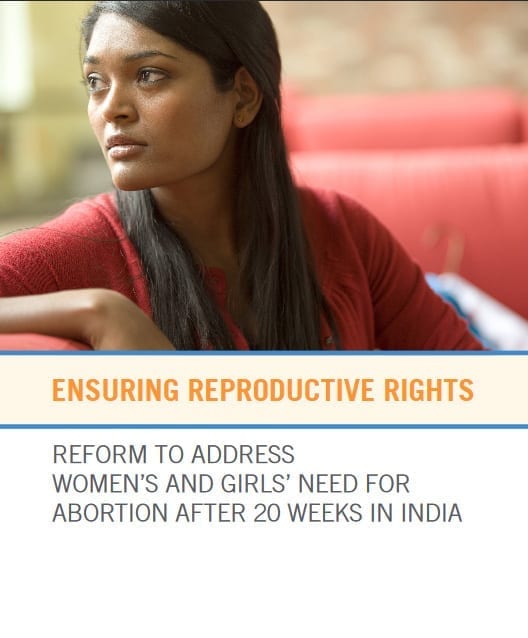Himalayan Times: Safe and Affordable Abortion is a Woman’s Right

by Melissa Upreti, Asia regional director for the Center for Reproductive Rights
Three years ago, Nepal’s Supreme Court (SC) catapulted the nation to the forefront of the global women’s rights movement by unequivocally ruling that women have a constitutionally protected right to safe and affordable abortion services. The story behind that groundbreaking decision begins with Lakshmi Devi Dhikta. Lakshmi is an extremely poor woman from Dadeldhura who already had five children when she became pregnant for the sixth time. She and her husband knew having another child would be too hard on their family financially and on Lakshmi’s health—so they went to a government hospital to request an abortion.
At the hospital, they were told to pay 1,130 rupees for the procedure, which they did not have. As a result, Lakshmi had no choice but to continue her unintended pregnancy. For years, Nepal was notoriously known for its restrictive and absolute abortion ban. Abortion was prohibited for every circumstance—without any clear exception even to save a woman’s life. For years, women were routinely imprisoned for having illegal abortions, while countless others died from complications due to unsafe abortion procedures. Unsafe abortion once accounted for half of all maternal deaths in Nepal. But things began to change in 2002. That year, the Muluki Ain was amended to legalize abortion in the first 12 weeks of pregnancy upon request, within 18 weeks in cases of rape and incest, and throughout pregnancy in the case of a severe fetal impairment or when the pregnant woman’s life or health is at risk. As a result of this change, strong advocacy by local and international organizations, and the release of a report by the Center for Reproductive Rights and the Forum for Women, Law and Development showing how the criminal ban violated women’s human rights, more than 50 women were released from prison. Just a few years later, in 2006, reproductive rights were recognized as fundamental rights in the Interim Constitution—equating women’s reproductive rights to constitutional rights. Due to these key legal and policy changes and the collaborative efforts of some government officials with women’s reproductive health NGOs, the number of women who die from unsafe abortion each year has been on the decline. By global standards, Nepal has taken huge steps forward for women’s human rights in a relatively short time. But, things need to be better. Despite these changes and progressive laws, Nepali women—especially poor and rural women like Lakshmi—are still too often unable to obtain abortions because of prohibitive fees, physically inaccessible facilities, and lack of knowledge of the legal status of abortion. In 2007, advocates fought to change that. The Forum for Women, Law and Development, Pro-Public, and a group of human rights lawyers worked with the Center for Reproductive Rights to file Lakshmi Dhikta v. Nepal before the SC. The court’s historic decision two years later made it clear that the government has an obligation to guarantee women’s access to safe and affordable abortion services by taking steps to remove key barriers. It established that the right to abortion is an essential component of reproductive rights and forcing a woman to continue an unintended pregnancy is a direct violation of her fundamental human rights. The court stated that unless reproductive rights are understood as women’s rights, “women would not be able to live freely with self-respect and equality, they would not be able to particulate fairly as competent, educated, and active members of society, and exercise their right to life, and the rights guaranteed to women under international treaties, the constitution and other laws would become unachievable.” But on the third anniversary of this ruling, the reality for Nepali women has yet to be changed. In 2011, after learning of Nepal’s overall progress and the landmark SC decision, the UN Committee that monitors the Convention on the Elimination of All Forms of Discrimination against Women (CEDAW), called upon the government to do more to ensure the protection of women’s reproductive rights, which included ensuring access to the full range of maternal and emergency obstetric care. The accountability process that was put into motion by Lakshmi Dhikta’s case will remain incomplete unless concrete steps are taken to implement this decision. Every four hours, a woman dies from pregnancy related causes in Nepal. These deaths are preventable, as are unintended pregnancies. Access to safe abortion is a critical way to save women’s lives. This is why the government must act now. On paper, the women of Nepal have some of the strongest reproductive rights in the world. But in practice, they are still suffering. They have fought hard to get their legal rights, but the government needs to do much more to make sure that they are able to fully exercise them. Unplanned pregnancies and unsafe abortions have devastating health consequences for women—but they are preventable. It’s time for the government to stop stalling and finally take action to implement the critical reforms our own SC ordered three years ago.
Read the story on the Himalayan Times and share your comments >,

